Ditapis dengan
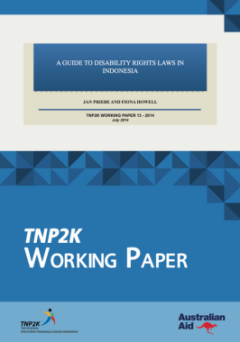
A Guide to Disability Rights Laws in Indonesia
In the past few decades, the Government of Indonesia has passed and signed a substantial number of domestic laws and international conventions/treaties that deal with the rights and opportunities of persons with disabilities (PWDs). Disability is a cross-cutting issue and requires an extensive review and monitoring of multiple pieces of legislation that have already been passed in or ratified b…
- Edisi
- TNP2K Working Paper 13 - 2014
- ISBN/ISSN
- 9786022751199
- Deskripsi Fisik
- viii, 38 Halaman, PDF
- Judul Seri
- Working Paper
- No. Panggil
- 341.48 PRI a
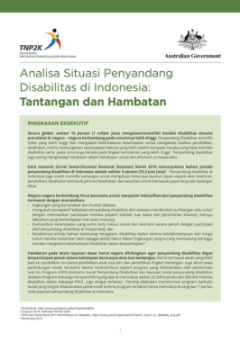
Analisa Situasi Penyandang Disabilitas di Indonesia: Tantangan dan Hambatan
Penyandang disabilitas di Indonesia tidak hanya menghadapi risiko ekonomi dan finansial yang besar, tetapi juga menghadapi tantangan besar dalam mengakses fasilitas dan layanan kesehatan serta pendidikan, perlindungan sosial dan memasuki pasar tenaga kerja. Sejak tahun 2018, Survei Sosial Ekonomi Nasional (Susenas) telah secara konsisten memasukkan Pertanyaan Disabilitas Kelompok Washington5 ya…
- Edisi
- 1
- ISBN/ISSN
- -
- Deskripsi Fisik
- PDF, 16 Halaman
- Judul Seri
- Policy Brief
- No. Panggil
- 371.9 SIY.A
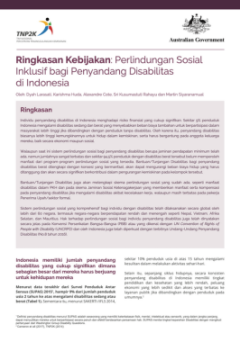
Ringkasan Kebijakan: Perlindungan Sosial Inklusif bagi Penyandang Disabilita…
Individu penyandang disabilitas di Indonesia menghadapi risiko finansial yang cukup signifikan. Sekitar 9% penduduk Indonesia mengalami disabilitas sedang dan berat yang menyebabkan beban biaya tambahan untuk berpartisipasi dalam masyarakat lebih tinggi jika dibandingkan dengan penduduk tanpa disabilitas. Oleh karena itu, penyandang disabilitas biasanya lebih tinggi kemungkinannya untuk hidup d…
- Edisi
- 1
- ISBN/ISSN
- -
- Deskripsi Fisik
- PDF, 8 Halaman
- Judul Seri
- Policy Brief
- No. Panggil
- 371.9
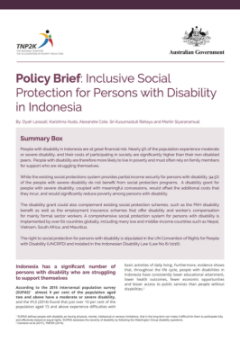
Policy Brief: Inclusive Social Protection for Persons with Disability in In…
According to the 2015 intercensal population survey (SUPAS)1 almost 9 per cent of the population aged two and above have a moderate or severe disability, and the IFLS (2014) found that just over 10 per cent of the population aged 15 and above experience difficulties with basic activities of daily living. Furthermore, evidence shows that, throughout the life cycle, people with disabilities in In…
- Edisi
- 1
- ISBN/ISSN
- -
- Deskripsi Fisik
- PDF, 8 Halaman
- Judul Seri
- Policy Brief
- No. Panggil
- 371.9 LAR.P
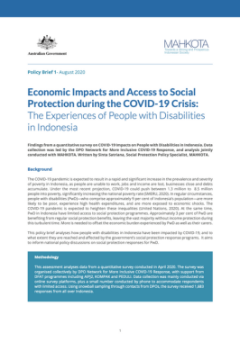
Economic Impacts and Access to Social Protection during the COVID-19 Crisis: …
The COVID-19 pandemic is expected to result in a rapid and significant increase in the prevalence and severity of poverty in Indonesia, as people are unable to work, jobs and income are lost, businesses close and debts accumulate. Under the most recent projection, COVID-19 could push between 1.3 million to 8.5 million people into poverty, significantly increasing the national poverty rate (SMER…
- Edisi
- 1
- ISBN/ISSN
- -
- Deskripsi Fisik
- PDF, 12 Halaman
- Judul Seri
- Policy Brief
- No. Panggil
- 371.9 MAH.E
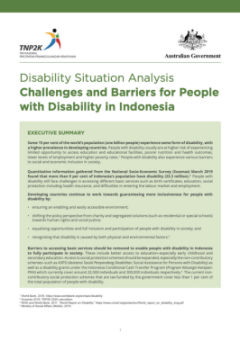
Disability Situation Analysis Challenges and Barriers for People with Disabi…
People with disability in Indonesia are not only at great economic and financial risk but are also facing great challenges in accessing health and education facilities and services, social protection, and in entering the labour market. In 2018, the Indonesia National Socio-Economic Survey (Susenas) included the Washington Group Disability Questions Set5 which aims to provide the most updated in…
- Edisi
- 1
- ISBN/ISSN
- -
- Deskripsi Fisik
- PDF, 16 Halaman
- Judul Seri
- Policy Brief
- No. Panggil
- 371.9 SIY.D
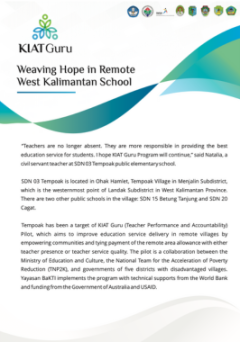
Weaving Hope in Remote West Kalimantan School
Teachers are no longer absent. They are more responsible in providing the best education service for students. I hope KIAT Guru Program will continue,” said Natalia, a civil servant teacher at SDN 03 Tempoak public elementary school.
- Edisi
- 1
- ISBN/ISSN
- -
- Deskripsi Fisik
- PDF, 4 Halaman
- Judul Seri
- Policy Brief
- No. Panggil
- 370 ARI.W
 Karya Umum
Karya Umum  Filsafat
Filsafat  Agama
Agama  Ilmu-ilmu Sosial
Ilmu-ilmu Sosial  Bahasa
Bahasa  Ilmu-ilmu Murni
Ilmu-ilmu Murni  Ilmu-ilmu Terapan
Ilmu-ilmu Terapan  Kesenian, Hiburan, dan Olahraga
Kesenian, Hiburan, dan Olahraga  Kesusastraan
Kesusastraan  Geografi dan Sejarah
Geografi dan Sejarah